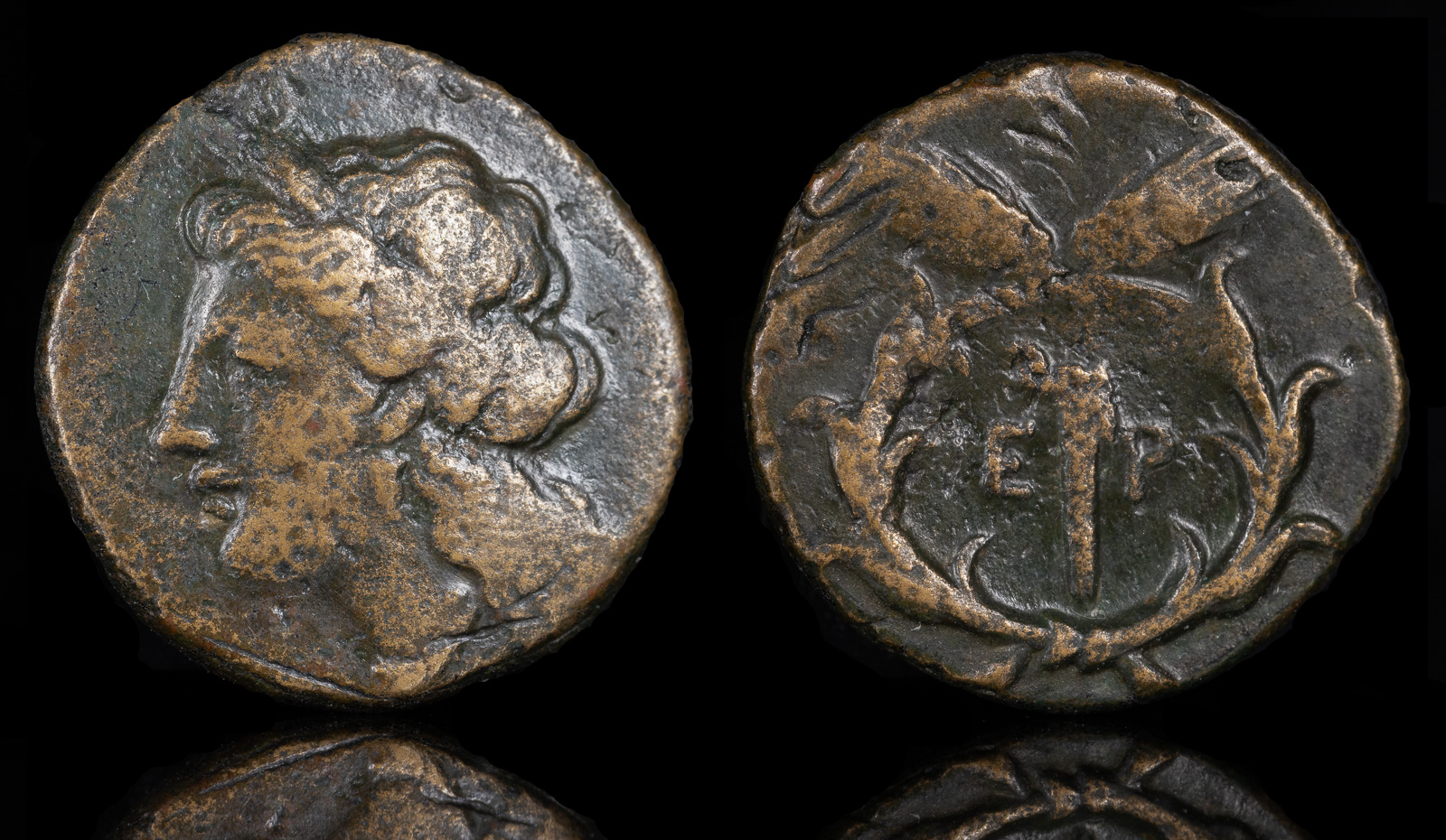
Argolis, Hermione
Circa 360-310 BCE
14.46mm 2.26g
Obverse: Head of Demeter Chthonia left
Reverse: Torch flanked by E-P, all within wreath
BCD Peloponnesos 1297
Ex BCD Collection (not in LHS sale)
Perhaps the biggest mistake the Dryopes who founded Hermione made was naming their city after a Harry Potter character. That has made research challenging, though on the positive the fans of the books seem unaware of ancient coins from the city, or they’d surely be far more expensive.
On the reverse of this coin is Demeter. Pausanias described Hermione in depth, but what he found most impressive was the Sanctuary of Demeter. Evidently, Demeter liked to travel to the Argolid once in a while, and Athera and Mysion were hospitable, but a man named Kolontas wasn’t and would not allow Demeter in his house for whatever reason.
His daughter Chthonia didn’t like this disrespect, so she burned him alive in his house. While normally society would frown on this act, Demeter was thankful and whisked her away to Hermione where she built the sanctuary. Pausanias then detailed the procession for the festival they hold each year.
Men, women, and children would all join a procession to the sanctuary. Everyone would dress in white and wear wreaths from a flower that Pausanias believed was a hyacinth. Behind them they brought a cow.
When they reached the temple, they would let the cow go and it was free to prance around the grounds. During this time the doors to the temple were wide open. At this point, the cow was probably thinking that she was free. So she wandered around and saw this temple, and at some point she was curious what was in there and waltzed in.
At that moment, the populace slammed the doors shut to lock the cow inside. There, four old women waited and their job was to slit the cow’s neck with a scythe. Once the cow as defeated, they repeated the act with three more cows.
Inside the temple were thrones where the old women waited for the cows along with portraits of previous priestesses of the sanctuary. Also present were statues of Athene and Demeter along with one “they worshipped most”, but which was accessible only to old women, so Pausanias was not able to describe it.
I do think the wreath on the reverse of this coin is similar to those worn for the procession. A torch is also at the center of this coin, and I wonder if they were required because it took some time for four cows to decide to enter a dark sanctuary.
To the right of the sanctuary was a colonnade called Echo’s colonnade, where anything said was echoed three times.
Strabo also discussed Hermione, stating that it “was not an insignificant city.” Supposedly the inhabitants had some form of “discount” when heading to Hades, since they were on a shortcut. Therefore, they didn’t require a fee for Charon, since they evidently had a way around the River Styx.
Pausanias gave more detail to the shortcut. Behind the Sanctuary to Demeter (also called the Temple to Chthonia) was a sanctuary to Klymenos, who per some sources was the brother of Chthonia but Pausanias believed to be another name for Hades. Within that sanctuary was an opening in the Earth, through which, according to the Hermioneians, Herakles brought back Hades’ dog. Perhaps that was where the torch was needed?
Not far from Hermione was the city of Mases, which in Pausanias’ time was used by the Hermioneians as a port, and a mountain previously called Thornax but renamed to Cuckoo Mountain because Zeus was supposedly changed to a cuckoo at the top. The story on why wasn’t detailed in Pausanias, but was covered in the notes by Peter Levi to my volume. He quotes Aristotle in a story where Hera wasn’t giving Zeus any, so he created a thunderstorm that waylaid her on that mountain, then disguised himself as a cuckoo to get inside her dress. Personally, I don’t think my wife would react well if a cuckoo went up her dress, but Hera must have been different.
Now that I’ve read these rather odd stories from the same city, I’m beginning to wonder whether that ‘torch’ in the center of the coin wasn’t a torch at all, but was instead something else many of us are familiar with. Either that, or the opening at the sanctuary to Klymenos was releasing some funky gas.
Much of the remains of ancient Hermione lie under the modern town of Ermione. Archeologists believe they have found the foundation of the Sanctuary to Demeter under a church.
Argos obtains possession of Hermione.
July
Sparta and their allies, including Sikyon and Tegea, defeat Athens and their allies at the Battle of Nemea. On Athens side are Thebes, Lokris Opuntii, and Corinth. With Sparta are Halieis, Sikyon, Epidauros, Troizen, and Hermione. Phlious remains neutral. Pellene fights on the side of Sparta against Thespiai.
Hermione ruled by tyrant named Xenon.
Aratos of Sikyon takes the Acrocorinth and frees Argos. Xenon steps down in Hermione.